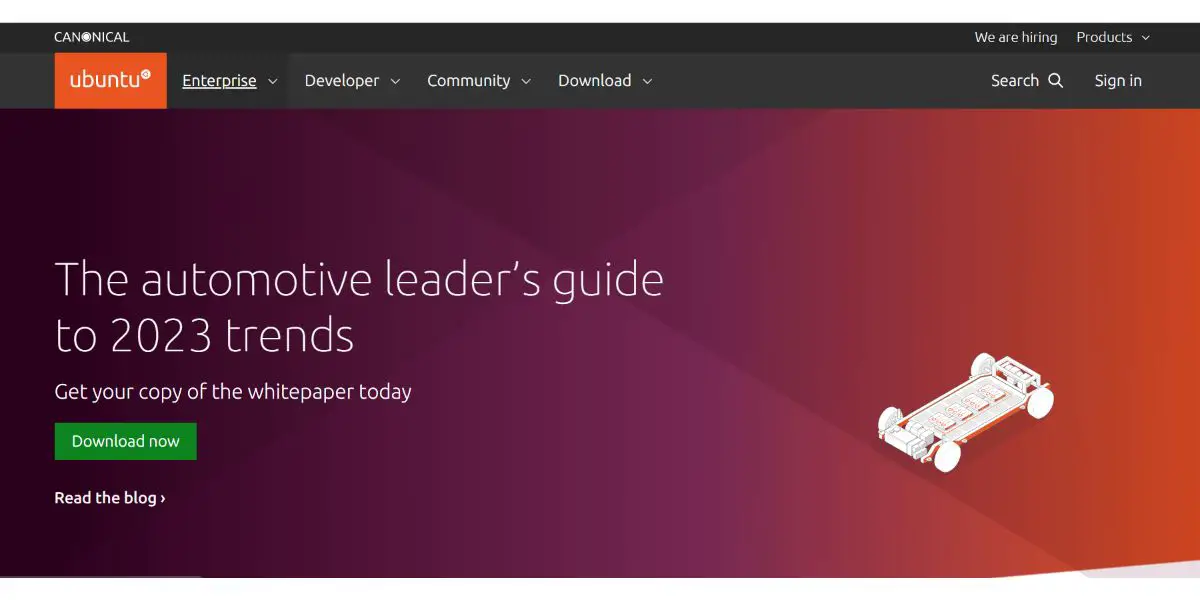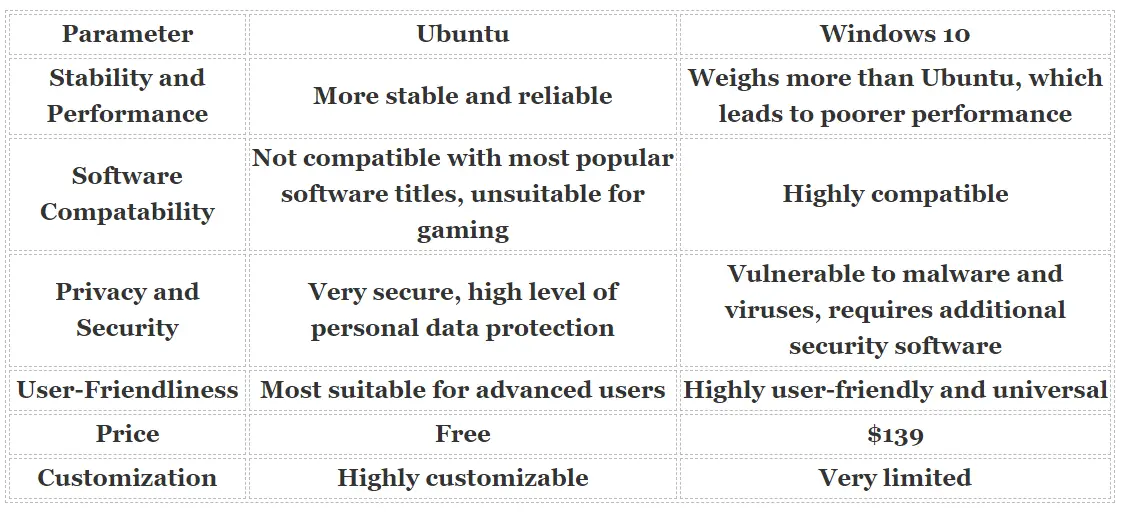Disclaimer: This post may contain affiliate links, meaning we get a small commission if you make a purchase through our links, at no cost to you. For more information, please visit our Disclaimer Page.
More and more people have been getting into trying out open-source operating systems recently as an alternative to Windows. Ubuntu, an OS based on Linux, is arguably one of the most popular among them. Is it better and more stable than Windows 10?
Ubuntu is more stable than Windows 10 and works faster. It also offers more security and better data protection, is highly customizable, and can be used for free. Yet, Windows is compatible with most software, has a more user-friendly interface, and is better for gaming.
In this article, we will offer a detailed comparison of the two operating systems to find out whether an open-source product like Ubuntu can compete with Windows, the veteran of the industry and still the most popular OS in the world.
Table of Contents
Ubuntu vs. Windows: A Comparison
Stability and Performance: Ubuntu Is Faster and More Reliable
Let’s begin by comparing the performance of the two operating systems. As we mentioned, Ubuntu is considered a more stable one, and most users agree that it beats Windows in performance considerably.
Even though Windows is working on improving its efficiency, it’s still falling behind compared to Linux-based systems. The reason for this is rather simple: Windows is a larger and more complex software that goes heavier on the system.
On the other hand, Ubuntu is highly practical and allows for even more optimization as you install it. As an open-source OS, it allows you to dig in and change anything to your preference or remove what you don’t need.
Thanks to this, Ubuntu is faster and more reliable: you can expect excellent performance from it, while Windows is much more prone to lagging and crashes.
Software Compatibility: Windows Supports More Apps
Whether you use your PC for school, work, or personal purposes, you will likely need more software than just a browser for Internet searches. Like MS Office to write docs or create PowerPoint presentations, Photoshop for your visual projects, and similar.
In terms of available software, Windows undoubtedly wins. The big names of Adobe and Microsoft, as well as many others, are not presented on Ubuntu. Granted, the OS has alternatives with similar functionality that you can use instead.
Yet there is a reason these specific programs are popular: they are time-tested, extremely user-friendly, and universally used worldwide. In a way, they are a standard, and if your professional or school work requires them specifically, Ubuntu won’t be an option for you.
Gaming: Only Possible on Windows
Another category of users Windows wins over easily is gamers. ubuntu has many advantages, yet using it for gaming is close to impossible.
Windows remains the most popular OS worldwide, so most PC games are created to run on it, with some of them being later ported to MacOS for Apple devices.
Ubuntu and other Linux-based systems are lightweight and can’t support the standard game requirements, especially in terms of graphics, so developers aren’t interested in creating games for them.
This also applies to streaming services and other kinds of entertainment: many programs Windows users are familiar with won’t work on Ubuntu.
Privacy and Security: The Main Priority of Ubuntu
Security and privacy are the two closely related aspects where Ubuntu is a clear winner. It’s also largely why more and more people are getting interested in open-source OSs. Ubuntu prioritizes protecting users’ privacy, and privacy concerns are relevant today more than ever.
Linux-based systems are generally more secure, mainly because they are not nearly as popular as Windows. The more people use an OS, the more scammers will choose it as their target, which is why the spread of viruses on Windows is beyond comparison.
The fact that Windows is so little protected from attacks also doesn’t help. The built-in Windows Security isn’t nearly effective enough to use the OS safely, so you have to install an antivirus and a bunch of supporting software to ensure no malware can steal or destroy your data.
Despite not being the main target of malicious intent, Ubuntu protects its users much more responsively. Any change to the system, however small it may be, requires you to enter your password to authorize it. Also, spreading a virus in an open-source system is overall harder.
You can still install antivirus software to ensure even more protection if you need to. Read this article to learn more about protecting your open-source OS.
Ubuntu doesn’t collect users’ personal data, and any privacy-sensitive features can be disabled easily if you want even more protection. On the other hand, Windows is a closed system where you have little control over where your data goes, and it’s not as protected.
User-Friendliness: Windows’s Interface Works for Everyone
If you know your way around computers, you will love Ubuntu. The feature that probably brought it most of its fans is the command line, where you can quickly type whatever you want the system to do. For advanced users, it’s a highly convenient tool.
Yet, not everyone is an advanced user, and it would be fair to say that Windows is much more user-friendly for the general public. It’s easy to navigate and almost intuitive; the interface is developed to be universally understandable and convenient for the widest possible audience.
Price: Ubuntu Is Available for Free
In terms of pricing, Ubuntu is a clear winner, as it’s an open-source system that can be used for free. It’s available for personal or professional use with no limitations.
Windows 10 can also be used for free; however, that won’t be a licensed version. Some functionality will be restricted, you won’t receive updates, and a watermark with a reminder to upgrade your windows version will remain on your screen until you do so.
So, if you’re using Windows, it’s in your best interest to pay for it. Ubuntu, on the other hand, is available for free in its full functionality.
Many point out that for your money you get a reliable, company-developed product that comes with customer support, while Ubuntu is open-source and mostly supported by the community.
Yet, community support is highly involved and provides excellent help when needed, and the ability of anyone to contribute to the product adds even more value.
Customization: Ubuntu Is All About Personalization and Convenience
Finally, let’s talk about customization, where Ubuntu is also a clear winner. Windows 10 has very limited personalization opportunities, mostly concerning appearance: background, icons, and similar.
Ubuntu is highly customizable, and that’s yet another benefit of its being an open-source operating system. Apart from the numerous customization options available during setup, you may go into the code and alter anything.
Again, this benefit is mostly for advanced users. As Windows aims to be as universal as possible, it limits available interface changes to prevent you from accidentally breaking your OS. Ubuntu, on the other hand, is all about freedom, and if you know your stuff about computers, you will find much value in it.
Bottom Line
Let’s summarize our discussion of Ubuntu and Windows 10 and highlight the main advantages of each operating system.
Conclusion
Ubuntu is more stable than Windows 10 as it is lighter and better optimized. It’s also highly secure, allows for broad customization, and is available for free. Windows 10, however, supports more software titles and is very user-friendly compared to Ubuntu.


